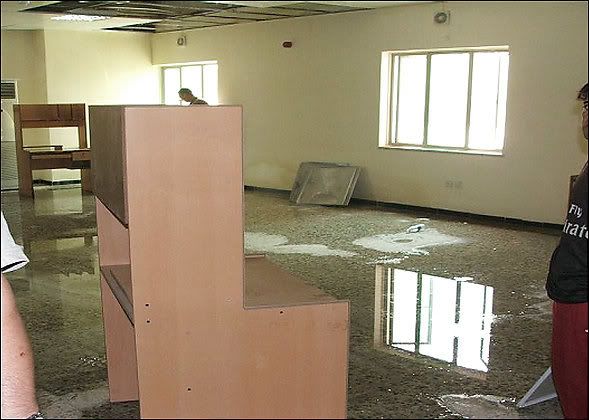The LA Times reports:
Air Force weapons officers assigned to secure nuclear warheads failed on five occasions to examine a bundle of cruise missiles headed to a B-52 bomber in North Dakota, leading the plane's crew to unknowingly fly six nuclear-armed missiles across the country.
That August flight, the first known incident in which the military lost track of its nuclear weapons since the dawn of the atomic age, lasted nearly three hours, until the bomber landed at Barksdale Air Force Base in northern Louisiana.
But according to an Air Force investigation presented to Defense Secretary Robert M. Gates on Friday, the nuclear weapons sat on a plane on the runway at Minot Air Force Base in North Dakota for nearly 24 hours without ground crews noticing the warheads had been moved out of a secured shelter.
"This was an unacceptable mistake," said Air Force Secretary Michael W. Wynne at a Pentagon news conference. "We would really like to ensure it never happens again."
If only there was this same attitude toward that Mess O'Potamia.
For decades, it has been military policy to never discuss the movement or deployment of the nuclear arsenal. But Wynne said the accident was so serious that he ordered an exception so the mistakes could be made public.
On Aug. 29, North Dakota crew members were supposed to load 12 unarmed cruise missiles in two bundles under the B-52's wings to be taken to Louisiana to be decommissioned. But in what the Air Force has ruled were five separate mistakes, six missiles contained nuclear warheads.
According to the investigation, the chain of errors began the day before the flight when Air Force officers failed to inspect five bundles of cruise missiles inside a secure nuclear weapons hangar at Minot. Some missiles in the hangar have nuclear warheads, some have dummy warheads, and others have neither, officials said.
An inspection would have revealed that one of the bundles contained six missiles with nuclear warheads, investigators said.
"They grabbed the wrong ones," said Maj. Gen. Richard Newton, the Air Force's deputy chief of staff in charge of operations.
After that, four other checks built into procedures for checking the weapons were overlooked, allowing the plane to take off Aug. 30 with crew members unaware that they were carrying enough destructive power to wipe out several cities.
Newton said that even though the nuclear missiles were hanging on the B-52's wings overnight without anyone knowing they were missing, the investigation found that the Minot's tarmac was secure enough that the military was never at risk of losing control of the warheads.
The cruise missiles were supposed to be transported to Barksdale without warheads as part of a treaty that requires the missiles to be mothballed. Newton said the warheads are normally removed in the Minot hangar before the missiles are assigned to a B-52 for transport.
The Air Force did not realize the warheads had been moved until airmen began taking them off the plane at Barksdale. The B-52 had been sitting on the runway there for more than nine hours, however, before they were offloaded.
Newton did not say what explanation the Minot airmen gave investigators for their repeated failure to check the warheads once they left the secured hangar, saying only that there was inattention and "an erosion of adherence to weapons-handling standards."
Air Force officials who were briefed on the findings said investigators found that personnel lacked neither the time nor the resources to perform the inspections, indicating that the weapons officers had become lackadaisical in their duties.
One official noted that until the Air Force was given the task of decommissioning the cruise missiles this year, it had not handled airborne nuclear weapons for more than a decade, implying that most of the airmen lacked experience with the procedures.
The Air Force has fired four colonels who oversaw aircraft and weapons operations at Minot and Barksdale, and some junior personnel have also been disciplined, Newton said. The case has been handed to a three-star general who will review the findings and determine whether anyone involved should face court-martial proceedings.
Despite the series of failures, Newton said, the investigation found that human error, rather than inadequate procedures, were at fault. Gates has ordered an outside panel headed by retired Gen. Larry D. Welch, a former Air Force chief of staff, to review the Pentagon's handling of nuclear weapons.







